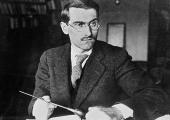Welcome Home, Captain Fox!, Donmar Warehouse

New comedy about a man who's lost his memory is a corker
It’s often remarked that are no new stories, only old stories retold. The French playwright Jean Anouihl got the idea for his first play from a French newspaper report of 1919, about a young man who turned up on a railway platform with no knowledge of who he was or how he came to be there. In the wake of the story’s publication, hundreds of bereaved families came forward to claim the unknown soldier as their own.









